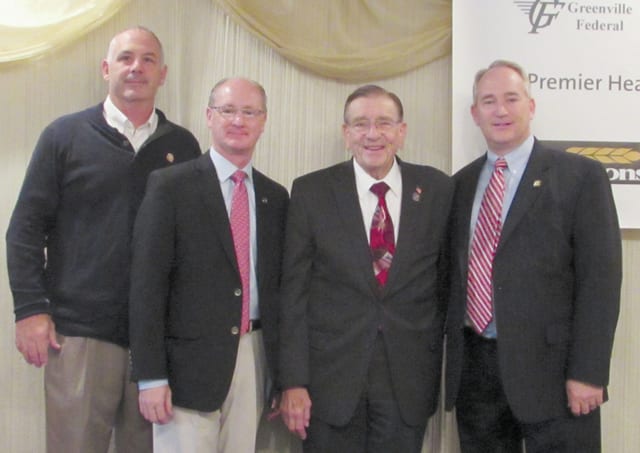
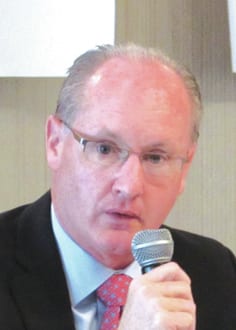
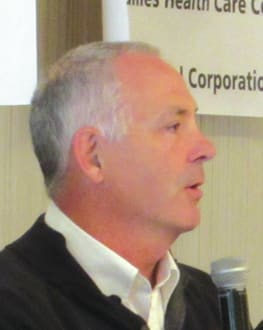
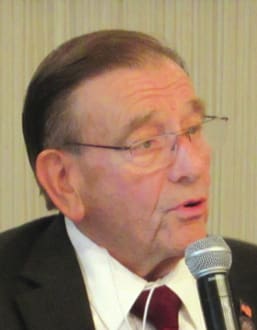
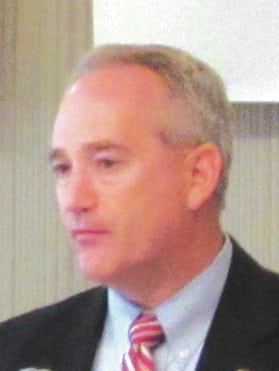
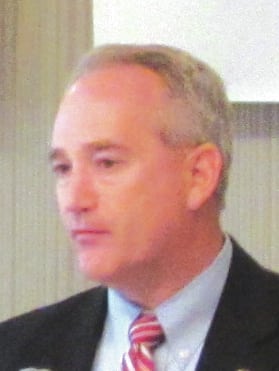
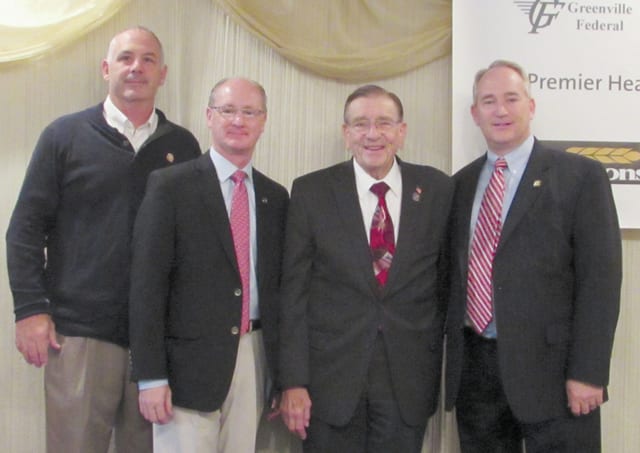
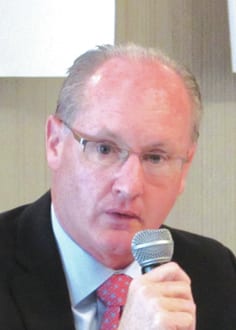
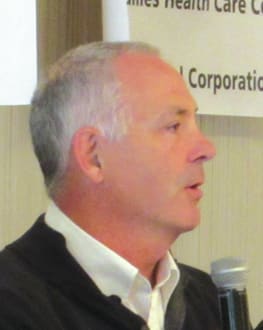
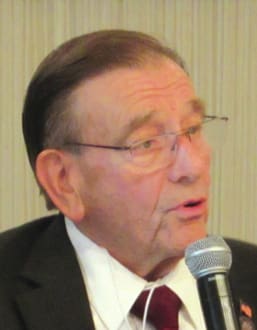
GREENVILLE — Four state leaders offered their thoughts on the economy, jobs, education, medicine, and business at the Darke County Chamber of Commerce’s “State of the State” Legislative luncheon held Friday.
State Senators Keith Faber (R-Celina) and Bill Beagle (R-Tipp City), and state Representatives Jim Buchy (R-Greenville) and Steve Huffman (R-Tipp City) spoke to chamber members at Romer’s Catering in Greenville.
Buchy, representing Ohio’s 84th House District, is not running for reelection this November 8. Faber, term limited as a state senator, is running for Buchy’s seat. Beagle’s senate term ends in December 2018, and he too is term limited. Huffman is seeking reelection to again represent Ohio’s 80th House District.
Sen. Beagle started off, speaking on the state’s efforts in workforce development.
“[Ohio Governor John Kasich] came in and gave us a charge, and what he said is ‘Now the time has come to produce something,’” Beagle said. “He asked, ‘Is our K-12 system preparing people for the jobs of today and tomorrow? Is our education system giving us, giving our kids the resilience to understand that their future won’t be like their parents present lives?’ He talked about how there’s a knowledge piece today that students need to be aware of and understand. Is our K-12 system, our college systems, preparing students for the jobs that exist. Are the students work ready when they leave high school?”
Beagle said the governor’s challenge has been accepted by the Ohio General Assembly’s Workforce Board.
“We’ve clarified his charge to us,” he said. “To prepare and continually retrain Ohioans of all ages for the jobs of today and tomorrow. That is what the charge is. What that means is, we have until the end of this year to submit concrete actionable items to the governor so that he can incorporate it into his final budget in 2017.”
Beagle said that one of the things the workforce board discovered was that the state’s efforts in workforce development had been “inconsistently” applied. He pointed to the state’s adult training and education efforts as an example.
“The training programs are not widely known, they’re often duplicative and not easily accessible, and they tend to be too reactive. So something’s happened in our communities, a manufacturer’s left or something has happened, and all the sudden a system is created to deal with some sort of crisis and there’s a failure to anticipate,” he said.
Rep. Huffman, a member of the legislature’s Marijuana Task Force, discussed the status of the state’s recently enacted medical marijuana regulations. He said the governor has appointed the 14 members of the state’s Marijuana Control Commission and that the group would meet within the next two weeks.
“The best part about the law is the commission is going to make the rules,” he said. “If we don’t like the rules in our revised code, we’ll go back and change them sometime next year.”
“There’s a lot of concern about cities like Greenville and Troy…there’s something called ‘Home Rule.’ They can decide not to have a marijuana business into their jurisdiction,” Huffman explained. “And I would agree to put on a temporary, six-month, ‘let’s wait and see what the rules are.’ I think that is the most prudent thing to do.”
“But I have confidence, like a lot of people do, that the Control Commission’s going to set the rules properly,” he added.
Huffman also expressed concern about the state’s budget, particularly as it regards Medicaid.
“The last two years it was paid for,” he said, “Now we have about 5 percent, or somewhere between $300-400 million in the next budget to pay for Medicaid expansion.”
“It’s a challenging time with the next budget, where it’s going to go, but I think the House and the Senate, with the governor, we’ll all get it right one way or the other when it comes out next year, and I would encourage everybody here to be engaged, he added.”
Rep. Buchy told the audience the legislature will be addressing a number of issues as it goes into its lame-duck session this fall.
“We’re going to hopefully have a piece of legislation that’s going to be helpful to business,” he said, in reference to unemployment compensation measures being examined. “That’s a key so we have lower cost of doing business to help us make money.”
Buchy also addressed his views on the City of Cleveland’s attempt to raise its minimum wage to $15 per hour,
“Cleveland’s a mess anyhow. If you want to raise the minimum wage to $15 an hour, that would be a big mistake,” he said. “The economy’s bad now. If you raise the minimum wage, it’s just going to get worse. The people that need the work the most are the people who are going to have less opportunities to work when you raise the minimum wage.”
He asserted that, according to the attorney general’s office, a municipality does not have the authority to raise its minimum wage higher than the rate established by the state.
Buchy discussed a bill, Senate Bill 3, sponsored by Faber, which would reward top-performing school districts in the state.
“Here in west-central Ohio, we’ve got the best schools, the best families…where we are, there’s no better place to live and work,” he said. “I’ve got five schools within 20 miles — Russia, Ft. Loramie, Minster, Marion Local, and Versailles. They’re in the top 50 schools every year.”
“Senate Bill 3 is the start of doing what we should have been doing a long time ago, and that’s giving the high-performing schools relief from some of the silly-ass stuff we do in the mandates,” Buchy said. “No disrespect to what the Department of Education does, but if somebody came to me and said ‘We’d like to get rid of the Department of Education,’ I’d say, ‘What can I do to help you.’”
Sen. Faber discussed the state’s expanding medical costs and the loss of health care providers.
“The real problem with Obamacare, and it’s starting to be felt now, it was intended,” he said. “I stopped a long time ago saying the people that designed and drafted, the Obamacare people, were sloppy and made mistakes — they knew exactly what they were doing. They wanted to crash the system to move us into a single-payer system. And guess what? They’re crashing the system.”
Faber said that the number of health care providers has fallen, and that in many Ohio counties, residents have access to only one or two providers.
“You know what happens when you lose competition? The prices have gone up,” he explained. “You’re seeing prices increase from a low of 7 percent to more than double in some cases. Since 2013, the average increase in premiums has been 94 percent.”
“This pressure on premiums is not just impacting people going to the marketplace, it’s impacting employer pressure as well,” he added. “So what you’re seeing is a drive to move people out of private healthcare and to leave them with very little choice but government subsidies, government health care.”
Faber encouraged chamber members to not only vote November 8, but to get others into polling places as well.
“I want you to go out and get your kids, grandkids, neighbors, people you play cards with, people in your church group, your bible study — all of those folks to vote too,” he said. “This election will have a huge impact on our kids’ and grandkids’ future.”









